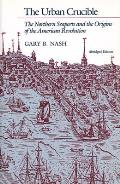Remembering the Work of Gary B. Nash
Gary B. Nash, a leading historian of the early America, died late last month just after turning eighty-eight years old.
This is from Carla Gardina Pestana’s obituary for Nash at the Omohundro Institute website:
This is from Carla Gardina Pestana’s obituary for Nash at the Omohundro Institute website:
Over the course of a very prolific career, Gary produced dozens of books: monographs both authored and co-authored, textbooks, edited collections. They were all written with flare and grace. His work ranged widely across the history of Quakers in early America; race, race relations, and African American history; and the American Revolution. . . .
Gary’s attention to race in early America has ranged widely but began with his path-breaking Red, White, and Black: The Peoples of Early America (1974). For younger scholars, it might be difficult to capture the shockwave that book generated, with its insistence that early American history can only be understood as the interaction among three groups, Natives, Europeans, and Africans. . . .
Gary’s contributions to the study of the American Revolution were varied, but his signature contribution was the 1979 The Urban Crucible: Social Change, Political Consciousness and the Origins of the American Revolution. Comparing three urban centers—Boston, New York, and Philadelphia—in the years leading up to and during the revolution, he showed how economic crisis helped to galvanize ordinary urban dwellers to engage in revolutionary politics. A signal contribution to New Left historiography, it continued a line of inquiry associated with scholars such as Jesse Lemisch and Al Young.
In addition to his research-based scholarship, Gary was a fierce advocate for history education. His involvement in the controversies surrounding the National History Standards, which pitted him against Lynne Cheney and all those who want history taught as a simple and patriotic tale of U.S. exceptionalism, are well known. Serving as the public face for maligned history educators was only one aspect of his commitment. In his retirement from UCLA, he oversaw the Center for History in the Schools which promoted U.S. history and World history education. He participated in curricular revision at UCLA and more widely. He hosted workshops for teachers for decades, for which he became well known and much beloved among K-12 teachers.


No comments:
Post a Comment